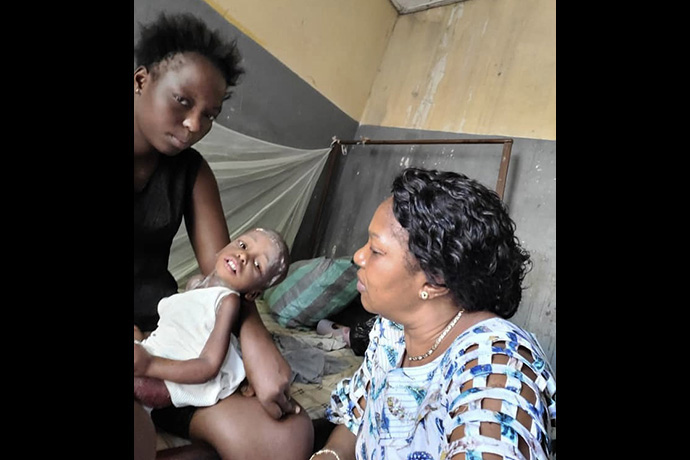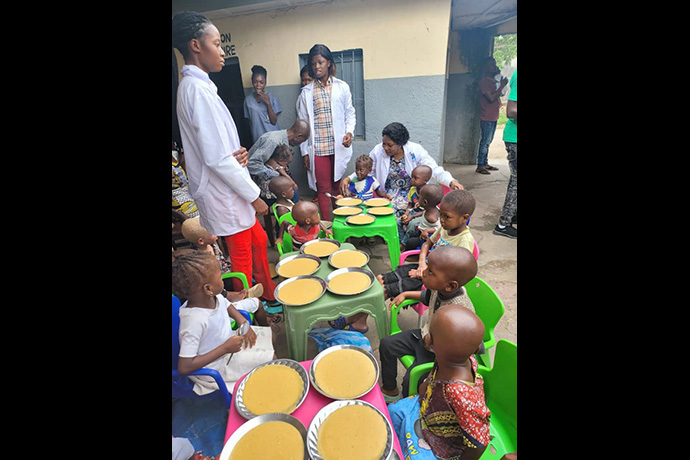
Key Points:
- The United Methodist Church strives to combat acute and severe malnutrition by providing nutritional supplements, medical care and advice to parents on infant feeding and care.
- In 2023, the church cared for more than 2,300 malnourished children, including 771 with acute malnutrition.
- Malnutrition is a major problem, particularly in the eastern region of Congo, where armed conflict has forced many families from their homes.
The United Methodist Church is striving to combat acute and severe malnutrition among children in Congo. In 2023, the church cared for more than 2,300 malnourished children, including 771 with acute malnutrition.
As part of the sixth phase of the Maternal, Newborn and Child Health program, United Methodists provide nutritional supplements, medical care and advice to parents on infant feeding and care. The program is supported by the United Methodist Board of Global Ministries’ Global Health unit.
In Eastern Congo, ravaged by armed conflict for over a quarter of a century, malnutrition has become a life-threatening scourge for many children. UNICEF recently reported that 2.4 million children under age 5 battle acute malnutrition in the region.
Dr. Marie-Claire Manafundu, coordinator of the church’s Maternal, Newborn and Child Health program in East Congo, said that parental poverty, armed conflict and poor education among women are among the main causes.
“Children affected by acute malnutrition,” she said, “are more likely to suffer from stunted growth, a weakened immune system, a predisposition to disease and, in the most severe cases, death.”

Crispin, 2, and Christine, 3, benefited from the help of The United Methodist Church. Crispin was suffering from severe acute malnutrition when his parents brought him to the Majengo United Methodist Health Center in Goma. After several weeks of treatment, the boy began to gain weight and regain his vitality. Following three months at Mangobo Methodist Hospital Center in Kisangani, Christine recovered.
The treatment given to more than 2,300 children includes a diet of soya, corn, peanut paste, palm oil and sugar, which they eat three times a week until their situation improves.
For many children, Manafundu said, recovery is observed after two months, while others require up to three months. Cases of relapse often occur.
“We are so grateful to the doctors and workers at the health center,” said Crispin’s parents, Francine Matisho and André Kubabezaga. “The church, through Global Health, saved our child's life.”
The United Methodist Church's work aims to improve the health and well-being of women and children in countries where maternal and infant mortality rates are highest.
“We are delighted that Crispin and Christine and so many others have been cured of severe and acute malnutrition,” Manafundu said.
Dr. Claude Watukalusu, medical supervisor in the church’s Kivu Conference, said he was proud of the activities that led to the children’s healing.
“The funds provided under the (Maternal, Newborn and Child Health) program have enabled us to provide malnourished children with the care they need to recover.”
Manafundu said the church is committed to continuing this care.
“These activities are essential to saving lives and improving children's health,” she said. “I am determined to continue working to fight malnutrition in the DRC. I want all children to have the chance to live healthy and productive lives.”
Léonard Shutsha Telonga, head nurse at the Majengo Health Center, thanked The United Methodist Church for its role in combating acute and severe malnutrition among children in Congo and in camps for people displaced by repeated wars.
Subscribe to our
e-newsletter
As part of the fight against child malnutrition, the church has developed new approaches. Community relays and other members of the new Infant and Young Child Feeding Group are hard at work.
Trained by health professionals, the groups are made up of volunteers, including mothers, according to Telonga.
“We've set up a group of moms we've put in the field to help us do voluntary screenings, too,” he said.
The aim of these groups is to raise parents' awareness of the importance of a healthy, balanced diet for their children. They also are responsible for detecting cases of malnutrition and referring families to the appropriate health services.
“It's very crucial for our case, because you know that with the war-displaced, these are people who have also suffered problems,” Telonga said. “It also causes psychological problems. So it requires support.”
Support groups set up by the church offer psychological counseling to families affected by malnutrition. They also help raise awareness and provide educational activities on mental health.
“That's why we've already trained community relays who do this psychological care work,” Telonga said.
Manafundu said that the treatment provided by the Maternal, Newborn and Child Health program illustrates just how much of a difference proper management of malnutrition can make to children's lives.
“The church continues to raise awareness, improve access to food resources and health services, and fight against the root causes of malnutrition, such as poverty and food insecurity,” she said.
Dr. Philippe Okonda, president of the health council for Eastern Congo Episcopal Area, said the progress is promising but more work remains.
“The recovery of these children is a ray of hope, but there is still much to be done to guarantee the health and well-being of all children in the Eastern Congo region,” he said. “The mobilization of organizations, authorities and society as a whole is essential to combat this scourge and give every child the chance to grow up in good health and realize his or her full potential.”
Londe is a broadcaster and UM News correspondent in Congo.
Contact: UM News Editor Julie Dwyer, [email protected] or 615-742-5469. To read more news from The United Methodist Church, subscribe to our free daily or weekly bulletins.



